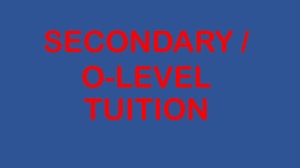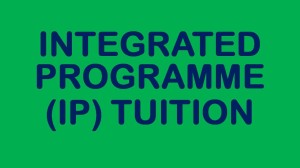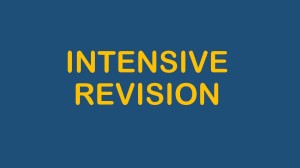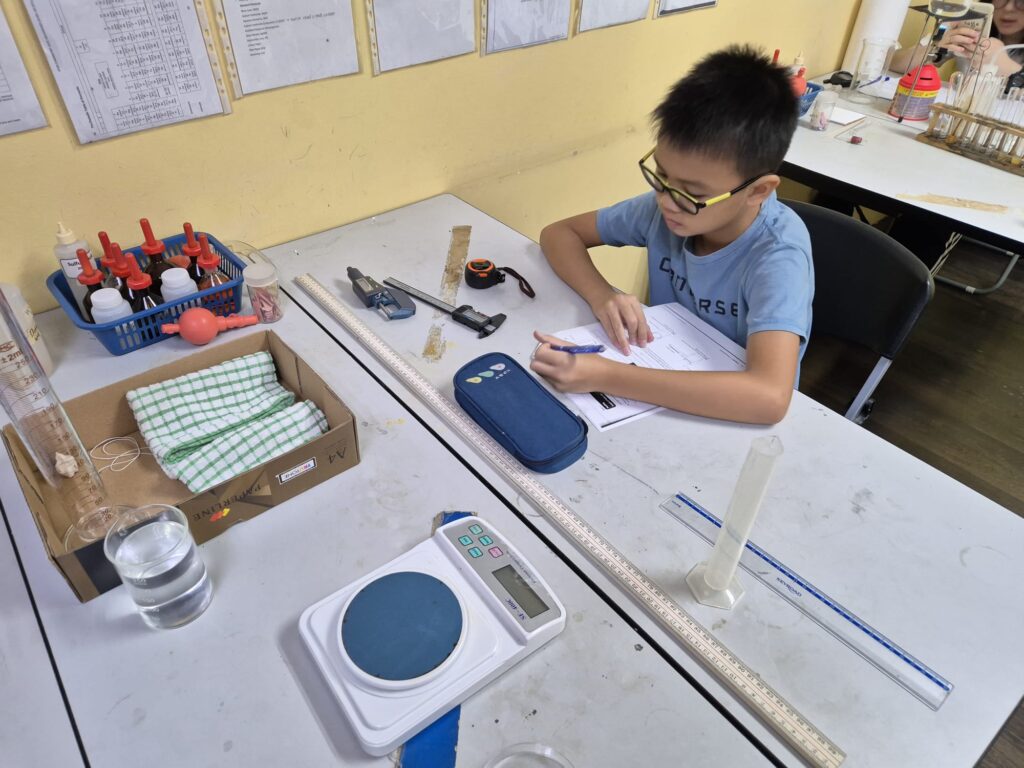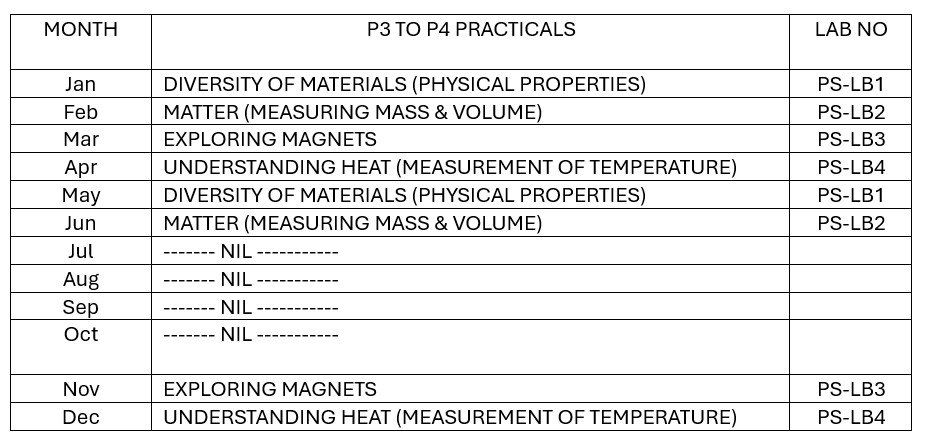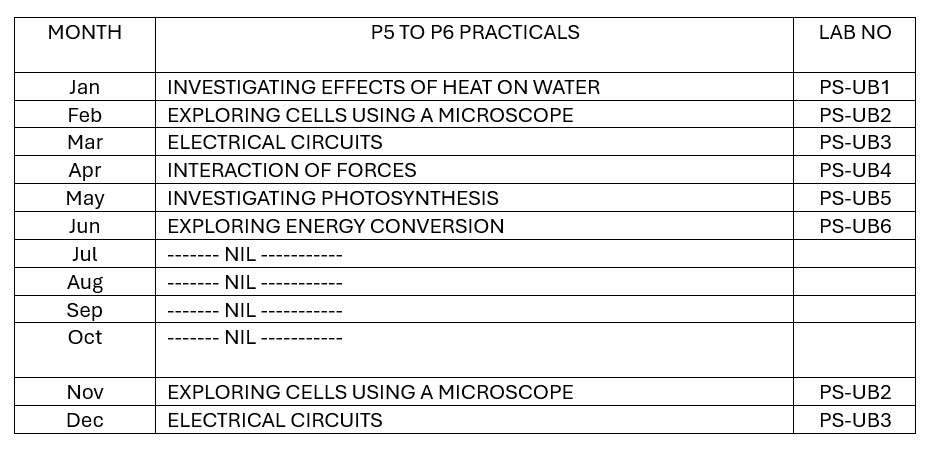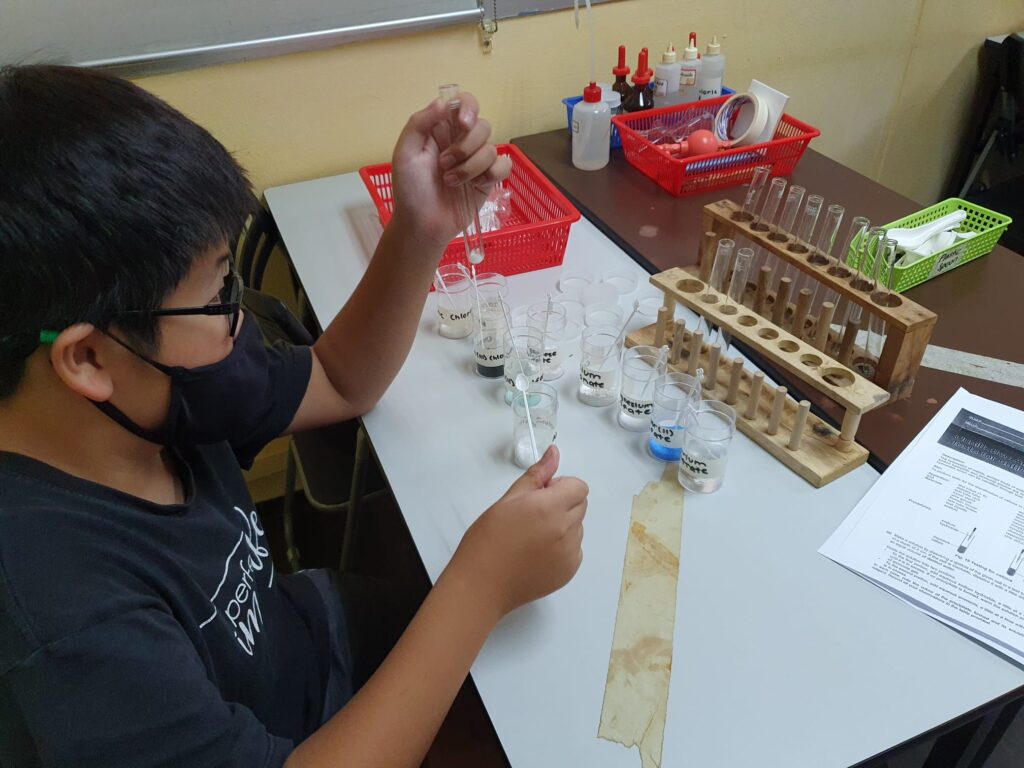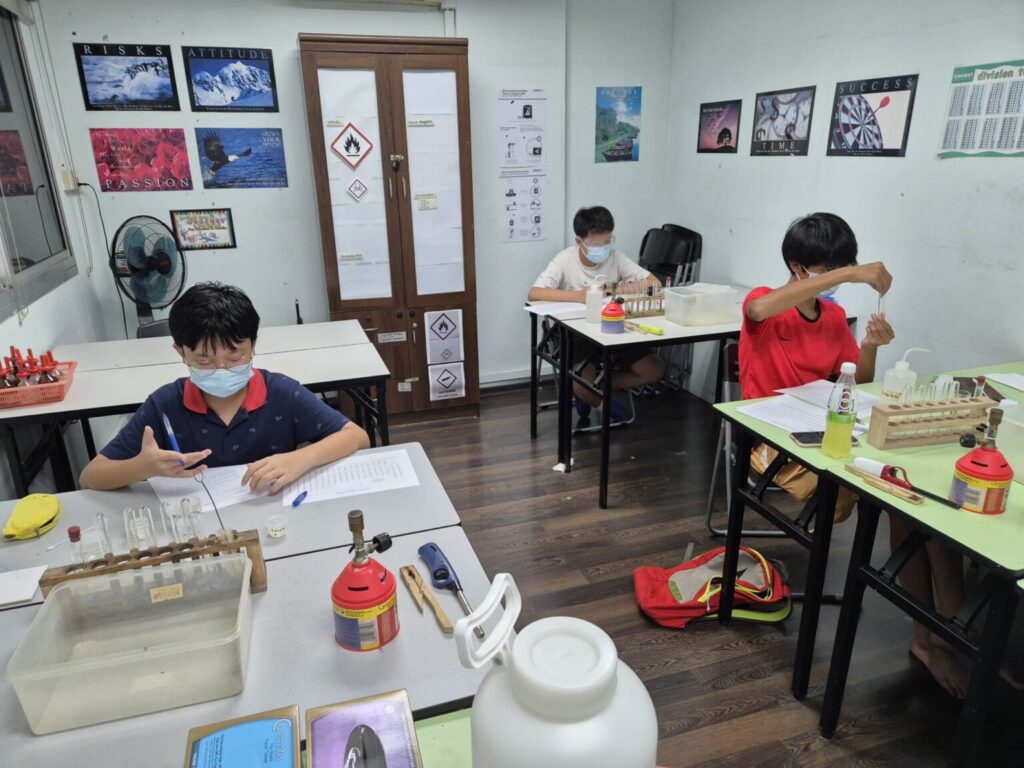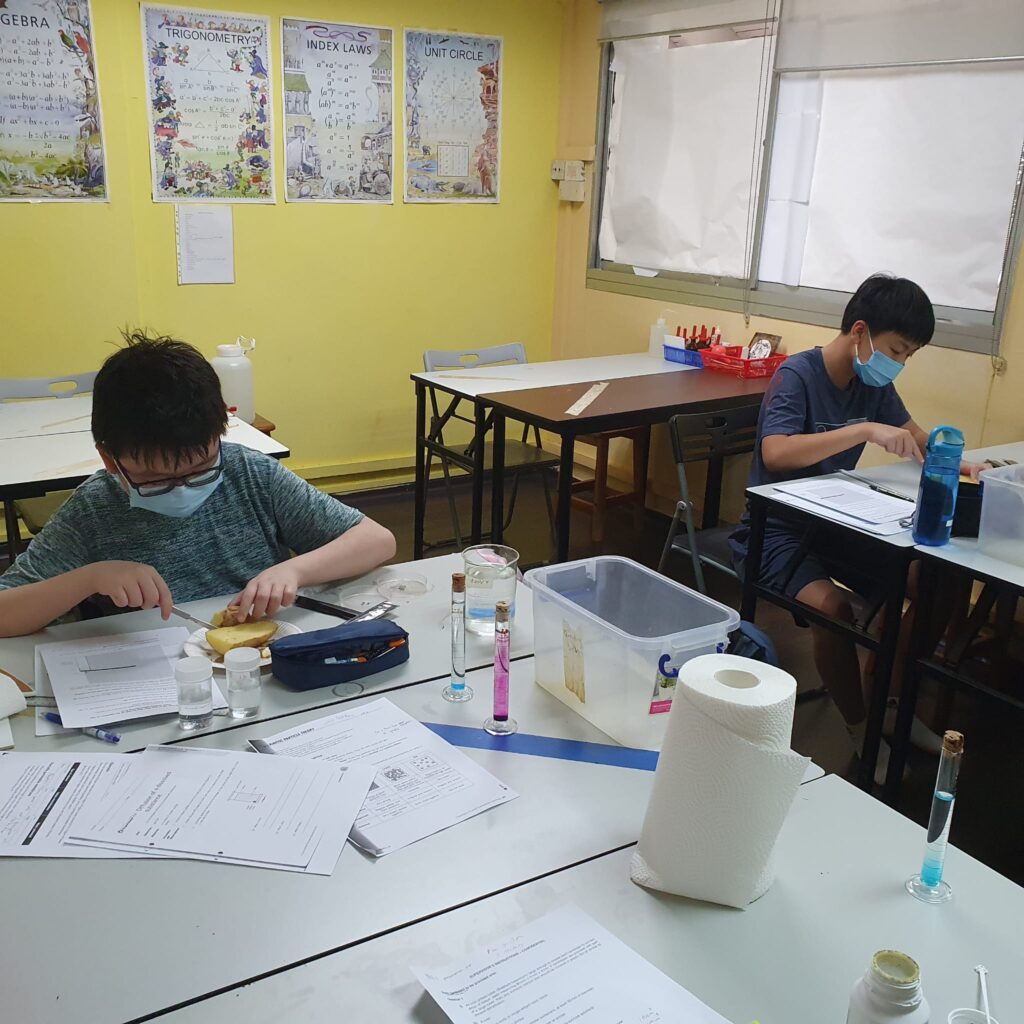The P3 MATH OLYMPIAD PROGRAMME is a 10-session (each session 1.5 hrs, weekly) programme to introduce P3 students to techniques and skills involved in solving non-routine P3 Math questions. As some of these P3 Math Olympiad questions are also similar to the difficult math questions found in P5 or in the PSLE, the heuristics learnt in this course will be useful to these students in their later primary years.
It is widely agreed that some of the non-routine or difficult PSLE Math questions are very similar to Primary Math Olympiad questions. Thus to get an A-Star for PSLE Math it may be necessary to acquire some Primary Math Olympiad problem-solving skills. Hence we encourage ALL primary school students to attend some kind of math Olympiad training before they take their PSLE Math exam. Math Olympiad is not just for students who are currently doing well in Math; we believe it is for EVERY primary student.
Primary Math Olympiad skills may also be useful to students taking the GEP or DSA selection tests.
Level/Subject: P3 MATH OLYMPIAD
Day: Mondays
Time: 4 pm – 5.30 pm
Location: Blk 644, Bukit Batok Central, #01-68. S(650644).
(Our location is just a 3-min walk from either the Bukit Batok MRT station or the Bukit Batok Bus Interchange. Buses that stop along the roads surrounding our location are numbers 157, 178, 66, 506, 173, 174, 176, 187, 985. Buses services which terminate at Bukit Batok Bus Interchange are 61, 77, 106, 173, 177, 189, 852, 941, 945, 947)
The objectives of the programme are as follows:
- To introduce students to heuristics commonly used in Primary Math Olympiad
- To give students confidence in solving non-routine or difficult Math problems.
- To train students to look at Math problems from multiple angles.
- To train students in analytical thinking and logical reasoning.
Focus: CONCEPTUAL UNDERSTANDING & METACOGNITION
Format: Teaching + Worksheets + Discussions
Total Course Fee: $290
TO REGISTER, SMS <STUDENT NAME> , <P3MOLYMP> TO 97860411.
As places are limited, pre-payment is encouraged to confirm your attendance. You can make payment by visiting the centre at the address above.
Course Outline:
|
Tricks in Addition and Subtraction |
|
Tricks in Multiplication and Division |
|
Working Backwards |
|
Finding Cubes |
|
Using Logic |
|
Looking for a Pattern |
|
Solve by Comparison and Replacement |
|
Solving Using Model |
|
Speed – Catching Up & Encountering |
|
Practical Problems |
Our HEADSTART programmes starting in NOVEMBER – REGISTER NOW!
A-LEVEL | JC | GENERAL PAPER TUITION (starting Sun 9 Nov – REGISTER NOW!)
A-LEVEL | JC | ECONOMICS TUITION (starting Sat 8 Nov – REGISTER NOW!)
A-LEVEL | JC | PHYSICS TUITION (starting Sun 2 Nov – REGISTER NOW!)
——————————————————————————————————–
Sec 4 (2015) Additional Math Headstart Tuition (starting Sun 2 Nov – REGISTER NOW!)
Sec 4 (2015) Pure Physics Headstart Tuition (starting Sun 2 Nov – REGISTER NOW!)
———————————————————————————————————
P4-P6 MATH TUITION (starting Sat 15 Nov – REGISTER NOW!)
P4-P6 SCIENCE TUITION (starting Sat 15 Nov – REGISTER NOW!)
———————————————————————————–
TO REGISTER, SMS <STUDENT NAME> <SUBJECT CODE> TO 97860411
Short-term ad hoc Math or Physics tuition during June Holidays 2014.
By all means, go for your holidays, even short ones (I’m going on 10, 11 and 12 June). However, if you had done badly in your SA1 or mid-year exams, do not let the June hols pass without reviewing your first semester work. For things will only get harder in the second semester, and some topics or concepts learnt in the first semester need to be used to understand some topics later in the year.
If you are too busy to attend weekly tuition, you might want to take the opportunity this June to consult a qualified and experienced tutor, for just a few hours and for a few difficult topics. Since it is the school holidays, the lessons can be in the mornings or early afternoons.
If you need solid tutoring in Pri, Sec or JC Math, or Sec or JC Physics, don’t hesitate to contact me at 97860411 and I’ll work out an arrangement for you. You may opt for individual tuition or in small groups of 2 to 4 students from the same class or school. Fees vary depending on the level and number of students.
If you have any queries, you may also call or sms to 97860411, or send an email to principal@singaporelearner.com.
If you are serious about improving your Math or Physics, hope to hear from you soon.
Rgds,
Ilyasa
PRI 3 – PRI 6 CONCEPTUAL LEARNING SCHEDULE 2014
Classes marked with a ‘*’ are Conceptual Mastery courses whereas those without a ‘*’ are Conceptual Drilling classes.
Conceptual Drilling classes are for students who need to strengthen their maths or science foundation, using constructivist and scaffolding approaches. Conceptual Mastery courses are for students who are ready to learn how to answer or solve challenging questions, using a metacognitive approach.
P3 Math*: Every Monday, 3.00 pm – 4.30 pm (Start Nov 18); Code: P3M1.
P3 Math: Every Wednesday, 3.00 pm – 4.30 pm (Start Nov 20); Code: P3M2.
P3 Science*: Every Thursday, 3.00 pm – 4.30 pm (Start Nov 21); Code: P3S1.
P4 Math: Every Monday, 3.00 pm – 4.30 pm (Start Nov 18); Code: P4M1.
P4 Math*: Every Tuesday, 3.00 pm – 4.30 pm (Start Nov 19); Code: P4M2.
P4 Science*: Every Friday, 3.00 pm – 4.30 pm (Start Nov 22); Code: P4S1.
P5 Math: Every Monday, 4.30 pm – 6.00 pm (Start Nov 18); Code: P5M1.
P5 Math*: Every Tuesday, 4.30 pm – 6.00 pm (Start Nov 19); Code: P5M2.
P5 Math: Every Saturday, 3.30 pm – 5.00 pm (Start 11 Jan); Code: P5M3.
P5 Science: Every Wednesday, 4.30 pm – 6.00 pm (Start Nov 20); Code: P5S1.
P5 Science*: Every Friday, 4.30 pm – 6.00 pm (Start Nov 19); Code: P5S2.
P5 Science: Every Saturday, 5.00 pm – 6.30 pm (Start 11 Jan); Code: P5S3.
P6 Math: Every Monday, 6.00 pm – 7.30 pm (Start Nov 18); Code: P6M1.
P6 Math*: Every Tuesday, 6.00 pm – 7.30 pm (Start Nov 19); Code: P6M2.
P6 Math*: Every Saturday, 9.30 am – 11.00 am (Start Nov 23); Code: P6M3.
P6 Math: Every Saturday, 12.30 pm – 2.00 pm (Start Nov 23); Code: P6M4.
P6 Science*: Every Friday, 6.00 pm – 7.30 pm (Start Nov 22); Code: P6S1.
P6 Science: Every Wednesday, 6.00 pm – 7.30 pm (Start Nov 20); Code: P6S2.
P6 Science*: Every Saturday, 11.00 am – 12.30 pm (Start Nov 23); Code: P6S3.
P6 Science: Every Saturday, 2.00 pm – 3.30 pm (Start Nov 23); Code: P6S4.
P6 Math: Every Monday, 6.00 pm – 7.30 pm (Start Nov 18); Code: P6M1.
P6 Math*: Every Tuesday, 6.00 pm – 7.30 pm (Start Nov 19); Code: P6M2.
P6 Math*: Every Saturday, 9.30 am – 11.00 am (Start Nov 23); Code: P6M3.
P6 Math: Every Saturday, 12.30 pm – 2.00 pm (Start Nov 23); Code: P6M4.
P6 Science*: Every Friday, 6.00 pm – 7.30 pm (Start Nov 22); Code: P6S1.
P6 Science: Every Wednesday, 6.00 pm – 7.30 pm (Start Nov 20); Code: P6S2.
P6 Science*: Every Saturday, 11.00 am – 12.30 pm (Start Nov 23); Code: P6S3.
P6 Science: Every Saturday, 2.00 pm – 3.30 pm (Start Nov 23); Code: P6S4.
Administrative Matters:
Location: Blk 627, Bukit Batok Central. Our location is just a 3-min walk from either the Bukit Batok MRT station or the Bukit Batok bus interchange. Buses that stop along the road in front of Blk 627 are numbers 157, 178, 66, 506, 173, 174, 176, 187, 941, 947, 985.
Max Class Size: 8
Monthly fee for each subject or slot for P6/P5/P4/P3 is $110/110/90/90 respectively, inclusive of materials fee. Discounts apply for multiple subjects or slots.
TO REGISTER, SMS <FULL STUDENT NAME>, <CODE> TO 97860411.
For enquiries, kindly call or sms to 9786 0411.
Pri 3-6 English, Math, Science Tuition
For our latest timetable, click here => 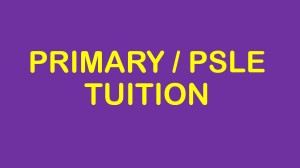
===============================================================
ORIGINAL POST(OUTDATED):
Pri 3-6 English, Math, Science
The following subjects and levels are provided, on weekdays and weekends:
Pri 6 Math: Mon 5.45 pm – 7.15 pm; Sat 9am-10.30am
Pri 6 Science: Wed 5.45 pm – 7.15 pm
Pri 6 English: Mon 4.00 pm – 5.30 pm; Wed 4.00 pm – 5.30 pm
Pri 5 Math: Mon 4.00 pm – 5.30 pm; Sat 9am – 10.30am
Pri 5 Science: Wed 5.45 pm – 7.15 pm
Pri 5 English: Mon 4.00 pm – 5.30 pm; Wed 4.00 pm – 5.30 pm
DETAILS:
Location: Blk 627 Bukit Batok Central #07-640
Tutor(s):
Mr Ilyasa; M.Ed (NIE), PGDE (NIE), BSc (NUS), A-Level (RJC); ex-sch teacher, full-time tutor (8 years) of PSLE, O and A Level Math and Physics.
Mr Jay Lim, Master degree, experienced full-time tutor of P5 and P6 Math, Science and English for 5 years.
Average Class Size: 3-8 students.
Fees Per Month:
Pri 5 or Pri 6: One subject, once a week (1.5h): $120 per mth; One subject, twice a week (3h): $220 per mth; Two subjects, once a week (3h): $220 per mth; Two subjects, twice a week (6h): $400 per mth; Three subjects, once a week (4.5h): $300 per mth; Two or three subjects, EVERY DAY (3h) Monday to Friday: $900 per mth.
Pri 3 or Pri 4: One subject, once a week (1.5h): $100 per mth; One subject, twice a week (3h): $180 per mth; Two subjects, once a week (3h): $180 per mth; Two subjects, twice a week (6h): $320 per mth; Three subjects, once a week (4.5h): $240 per mth; Two or three subjects, EVERY DAY (3h) Monday to Friday: $720 per mth.
For enquiries, call or sms to 97860411. To register, sms Student Name, Subject, Level and Day/Time to 97860411. Thank you.
Something is wrong if your child cries during or after an exam.
Today, both my P5 and P3 daughters told me that some of their classmates were in tears after their Math SA1 exams.
When children cry during or after an exam, it is not simply because the paper is too difficult. Personally I have encountered many difficult test and exam papers in my life, but I have not cried even once because of them. Nope, I don’t think it was because I was a boy; I can’t even imagine my daughters crying because of exams. If they do, then I know I’ve failed as a parent as far as their psychological development is concerned.
Yes, it’s about expectations, or setting them too high, and warning about consequences should the targets not be achieved. Looking back, my parents hardly ever asked me about my school work, and when I told them I would do badly in a paper, they would just comfort me and at worst joined me in my sadness! No scoldings, no cancellation of rewards, not a single kind of punishment or threat.
Yes, I do expect my daughters to do well in their studies, but I do not tie the outcome to rewards or punishment. I give them rewards because I love them, not necessarily because they deserve those rewards. I punish them for wrongdoings, not for performances in tests or exams.
Maybe those children cried because they have too high an expectation of themselves. Then it is their parents’ duty to help them manage their expectations (if the parents can manage their own expectations of course). Or maybe some children just cry easily at the slightest encounter with a difficulty or setback? Whatever the case, children are children and I wouldn’t hold THEM responsible for anything.
Rgds,
Ilyasa
My P5 daughter topped her class in a recent science test.
She obtained 28 out of 30 marks. Of course immediately I asked her about the missing two marks (as though the 28 are not important, but hey, i’m Singaporean u know).
Rahmah has formal science tuition once a week, taught by Mr Lim at my home centre. But almost everyday, she gets to ask her elder sister, my wife and me about science. She’s not really interested in science, except for rocks and minerals which she buys and collects.
My technique is to teach my children science whenever and wherever I can, as my time with them is not much (when I’m free, they would be in school and when they are ‘free’, I would be giving tuition to other people’s children).
Of course it helps that I’m a physics tutor, with lots of knowledge about chemistry as well. I only get irritated when my children ask me about factual biology questions, such as the parts of a plant cell. For that, I normally ask them to use the internet. This is to develop them to be more resourceful and not to immediately rely on others for answers.
If you want your children to be good in science, ask them to read a lot about science and make them think about what they see around them. For eg, ask them why is it easier to cut chicken with a knife than with a metal ruler. In science, you can’t just say it is because the knife is sharper; the scientific answer has to do with force and surface area, or pressure.
Rgds,
Ilyasa
===============================================================
For our latest timetable, click here => 
“Models (drawing of) destroyed my life.” – Sec 3 Math student
I laughed when he said it. But it’s a significant statement by my Sec 3 Math student made two days ago. It’s something I’ve been warning parents and students about, in my earlier article Beware the Critical Years in Math.
This Sec 3 Math tutee is from a top government secondary school in the west. Being mathematically intelligent, he had found it easy to use models-drawing to solve PSLE Math problems. But he had a hard time coping with Algebra in Sec 1 and Sec 2, and it’s affecting both his Math and A. Math performance now. This situation is not unique to him.
The best years of learning by your brain is probably from the time you were born to just before your teenagehood. Singaporeans around my age or older were taught to use algebraic equations to solve math problems at the PSLE back then. I remember using simultaneous equations in 1984 to solve today’s “guess & check” problems in the PSLE. Thus our algebraic skills were good and it helped us, even those who didn’t do well at the PSLE, in doing O-Level and A-Level Math.
Algebra is SO important for Math at O-level and A-level, yet our dear MOE chooses not to introduce it for problem-solving in today’s PSLE. I still don’t understand why.
It is true that some young students may not be able to understand Algebra, due to it being very abstract. But it is also true that some young students are not visually or spatially intelligent enough to draw, cut and move rectangles to solve problems. For eg, what has rectangles got to do with mass or age? (you know, those problems involving age relationships between persons or mass relationships between objects). Using rectangles or boxes to represent age or mass is just as ridiculous or abstract as using letters such as ‘x’ and ‘y’ as in algebra.
The least the MOE should do is to allow the teaching of BOTH methods to solve problems. Since those boxes start appearing in P2 or P3, algebraic expressions should also be introduced at P2 or P3, algebraic expansion in P4, algebraic factorisation in P5, and algebraic equations in P6. Sec 1 students can straightaway start on algebraic fractions etc. Do we lose anything by introducing algebra earlier in our math curriculum?
I’m glad I started my Sec 1 Algebra course for post-PSLE students in Nov and Dec last year (see Sec 1 Algebra Headstart Holiday Enrichment Programme for post-PSLE students). I think students still don’t realise how ill-prepared they are for math in sec school and JC. I dare say that if you are weak in your S1 and S2 algebra, you don’t have to take Math anymore.
Good Luck.
Rgds,
Ilyasa
(M.Ed., PGDE, B.Sc, ex-teacher, full-time tutor: 97860411)
_______________________________________
TUITION CLASSES:
_______________________________________________________________
EDUCATIONAL SERVICES:
______________________________________________________________
By EX-MOE TEACHERS & EXPERIENCED TUTORS
@ BLK 644, BUKIT BATOK CENTRAL, #01-68. S(650644).
CALL 65694897 OR SMS 98530744 OR 97860411.
List of ‘Top’ Primary Schools (2012) based on GEP classes and Awards achieved
The following system ranks primary schools according to the number of gifted classes available in a school from P4-P6, and how many awards they have obtained in 2011. The information has been taken and analysed from the MOE’s website.
For ease of reading, the numbers in the table under each column heading is the number of awards/classes there are, while the number in [ ] is the points that we assign to each award/class based on our judgement of the perceived relative importance of these programmes or awards. The Total is the number of points obtained by each school for the purpose of our ranking.
Gifted Education Programme (GEP)
As the presence of GEP classes in a primary school is an indication of the recognition and support that such schools have from the government, 3 points are awarded for each class present in the school from Primary 4-6.
School Distinction Award (SDA) & School Excellence Award (SEA)
As the SEA and SDA are very prestigious awards for a school, 2 points will be awarded for each of these awards obtained.
The following awards are assigned one point each for the purpose of computation of the ranking:
Development (DA) and Outstanding Development Award (ODA) (National Education)
Development (DA) and Outstanding Development Award (ODA)(Character Development)
Best Practice Award (BPA)
Special Award (SA)—Lee Kuan Yew National Education Award (LKY NE Award)
PRIMARY SCIENCE EXPERIMENTS
This page is for students who are keen to join our Young Scientist Programme, from P3 to P6, to enhance their learning of scientific phenomena and concepts, as well as to develop their science investigative skills such as making a hypothesis, understanding variables, observing changes in test specimens, collecting data, deducing relationships or trends, and making evidence-based conclusions.
Such students may also keep and maintain a portfolio of their scientific investigations for DSA purposes.
For expressions of interest or early bookings, please don’t hesitate to send a message to 88765498, as we can cater to a maximum of only 10 students in one session.
P3 TO P4 SCIENCE PRACTICAL SCHEDULE
P5 TO P6 SCIENCE PRACTICAL SCHEDULE
PRIMARY SCIENCE PRACTICAL TRAINING:
- Each session is 1.5 hrs.
- Each session covers the practical sections (plus some theory) of one Topic.
- Available only from Nov to June.
TIMETABLE
Practical Timings:
Mon, Tue, Fri: 11am-12.30pm | 4.30pm – 6pm
Sat, Sun: 5pm – 6.30pm
Mar, Jun, Nov, Dec school hols: To be announced.
*For Mar, Jun, Nov and Dec school holidays we will have special days and times for Primary Science Practical Enrichment which will be announced later. For expressions of interest or early bookings, please don’t hesitate to send a message to 88765498, as we can cater to a maximum of only 10 students in one session.
If you have any queries kindly contact Admin at 6569 4897 or 88765498 (Whatsapp)

